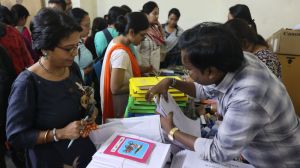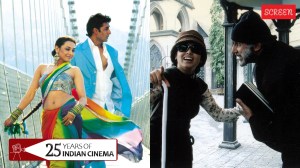Stay updated with the latest - Click here to follow us on Instagram
Get to Know The Folk
Almost 20 kms away from the din of traffic and tourists in Jaisalmer in Rajasthan,is the sleepy village of Hamira,where 80-year-old Sakar Khan lives with his family.
Almost 20 kms away from the din of traffic and tourists in Jaisalmer in Rajasthan,is the sleepy village of Hamira,where 80-year-old Sakar Khan lives with his family. Here,the wind from the desert sands is mixed with the tender melodies of the kamancha,a type of folk fiddle played by Khan,and the complicated rhythm sets of the khartaal,a percussion instrument comprising wooden blocks. For the people of this village,Khans performance with legendary American violinist Yehudi Menuhin,or a concert with the famous Beatle George Harrison is just another performance abroad.
A few months ago,as Khan played in his tiny house with a picture of him receiving the Padma Shri in the background,and with neighbourhood children peeking through the windows it was for Delhi-based entrepreneurs Ankur Malhotra and Ashutosh Sharma. The duo hunkered down beside their microphones,mixers and basic recording equipment,making analogue recordings of Khans music.
The recording comprises several interesting tunes on an ancient instrument,but the music is interspersed with sounds of the surroundings the piercing note of a train whistle,an occasional wah from a local fan,a cry of chai lenge aap from the background,and the shriek of a pressure cooker somewhere close. Yet,far from distracting,the sounds serve to root Khans music in his milieu. This recording and others made with Sakar Khan will be released as an album titled At Home with Sakar Khan (Amarrass Records) later this month.
Malhotra and Sharma,both 37,have been undertaking many bumpy rides across the country often without the aid of maps or signboards catching up with folk musicians and archiving their music.
This is similar to the endeavours by musician,historian and archivist Alan Lomax in the last century,who had travelled thousands of miles,collecting American and British folk songs and interviews. His recordings are said to have helped in the revival of American and British folk music from the 40s to the 60s.
Malhotra and Sharma tested waters last year by releasing the first volume of Field Recordings from the Indian Desert,and the response was encouraging enough for them to continue their journey. Apart from being released as albums,the recordings can also be downloaded from amarrass.com.
For us,the trigger was that these musicians are world-class performers and we spotted them at gigs in big cities and at places such as Lincoln Center in the US. The performance would end and they would go back to their native villages. We wanted to uncover the real story of these musicians, says Malhotra.
Among the places they have visited are Raneri in Rajasthan to record Lakha Khan,who plays the Sindhi Sarangi,and to Barmer,also in Rajasthan,to record the Barmer Boys Mangey Khan,Bagga Jhan and Meisa Ram. Sharma says that there is a unique level of comfort when folk artistes perform at home,in their houses and for their own people. It is music that is performed with the community and for the jajmaan (benefactor). It cant happen in an air-conditioned studios, says Malhotra.
The project will also introduce a host of tribal musicians from various parts of the country to music lovers. Among these are the Sidis Indians of African descent who live primarily in Gujarat who play a mix of calypso and Indian music. The trance-inducing percussion of their music was what we found interesting, says Malhotra.
Sharma adds that he and Malhotra have made a conscious effort to not clean up these albums. The whole idea is to have field recordings,we want the music to reach the audience as it is, says Sharma.
The artistes are paid a stipend during recording and 50 per cent of the royalty from the album sale. Everything is done in the folk artistes environment,so he cracks jokes with us,shares beedis and makes some brilliant music, says Sharma.







